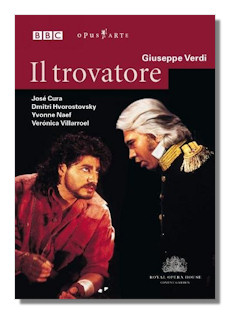
The Internet's Premier Classical Music Source
Related Links
- Verdi Reviews
- Latest Reviews
- More Reviews
-
By Composer
-
Collections
DVD & Blu-ray
Books
Concert Reviews
Articles/Interviews
Software
Audio
Search Amazon
Recommended Links
Site News
 DVD Review
DVD Review
Giuseppe Verdi

Il Trovatore
- José Cura (Manrico)
- Verónica Villarroel (Leonora)
- Dmitri Hvorostovsky (Conte di Luna)
- Yvonne Naef (Azucena)
- Tómas Tómasson (Ferrando)
Orchestra & Chorus of the Royal Opera House, Covent Garden/Carlo Rizzi
BBC Op. Arts DVD OA0849D 172min
Filmed onstage on May 3, 2002, this is not quite a traditional Il trovatore. Director Elijah Moshinsky has moved the action to the period of the Italian risorgimento, circa 1865. This, in itself, is not a problem, but the result is an "Anvil Chorus" without anvils (the gypsies seems to be hanging around in a boiler room somewhere) and a convent scene that appears to take place on a train platform, which makes the Count's instructions that his men should hide among the beeches ridiculous. Manrico, puffing a cigarillo at the start of Act Two, is costumed like Garibaldi. Moshinsky seems to have forgotten that the opera is named "The Troubadour," not "The Revolutionary." Ferrando and the soldiers engage in fetishistic military behavior. At the start of the opera, they are polishing their cannons (!), and in Act Three, there is a rather kinky display of what is known as Schläger dueling. It looks like leather night at the local gay bar.
Musically, while this is not a perfect Trovatore, there is enough to be happy about. Hvorostovsky's angry Count is impeccable, except at the end of Act One, where Moshinsky asks him to sing and swing a sword at the same time. The singing suffers. "Il balen del suo sorriso," despite the scene's lame staging, is a highlight. Although her Azucena is clearly too young to be a plausible mother to Cura's Manrico, Yvonne Naef gives it her all. She's a smart, talented mezzo with a powerful voice, and she cleanly articulates all her notes in "Stride la vampa" – no easy task. She plays along with this production, even when she is sexually assaulted at the end of Act Three, Scene One – another bad idea from Moshinsky. Chilean soprano Verónica Villarroel has an interesting voice – think Pilar Lorengar and Montserrat Caballè – with a beautiful, rich lower register and floated high notes. "Tacea la notte placida," the "Miserere," and "Tu vedrai che amore in terra" are beautiful; "D'amor sull'ali rosee" rather less so because of excessive scooping and sliding. In the title role, Cura makes a heroic impression and sings with the requisite machismo. His voice is starting to show some wear though; here's another tenor who loves (his voice) well but not wisely." Tómasson's Ferrando, scarily bald, doesn't make much of an impression. Rizzi is mostly sympathetic, apart from a rushed "Ah sì, ben mio" and some unnecessary cuts – "Di quella pira" gets chopped in half, perhaps to allow a more stage-effective exit for Manrico and his followers. Good work from the orchestra and chorus.
There are three special features: one with the principals talking about their roles, one with Moshinsky and colleagues discussing the production, and a little feature about Schläger dueling. I found all three enjoyable. Visually, this DVD works well, although the dimness of this production does no one any favors. The sound is good too – either stereo or surround sound can be selected.
Copyright © 2007, Raymond Tuttle




















